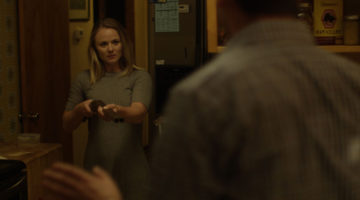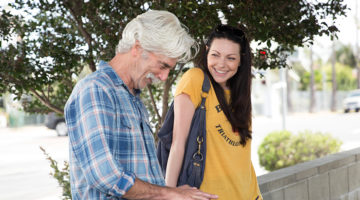Review: When Marnie Was There
It is important to remember that Studio Ghibli is first and foremost a studio. So that while Hiyao Miyazaki has hung it up, the studio is still producing some first class works, (the Ghibli in title refers to a strong wind, as in Studio Ghibli will blow through other animation studios).
This is true of the latest effort, When Marnie was There, achingly directed by Hiromasa Yonebayashi, and certainly does not need to be a swan-song for Studio Ghibli, as this tale holds its weight with some of the classics in the studio’s history. Moreover, the themes in the movie serve as a kind of reflection for the past and also the challenge of moving forward, so while it may be too much to read into the film as an elegy for the studio, it certainly makes for a compelling film.
Twelve year old Anna clearly is not getting along in the big city of Sapporo, as she is an artist and asthmatic and needs the clear air of the countryside, (in all senses). It is here that she meets the titular Marnie, and while the film is as much about Anna as Marnie, (perhaps even moreso), it is clear that Marnie serves as the sense of rebirth, the poetic, spiritual and artistic rebirth that Anna so desperately needs.
It is initially alarming that this rebirth would come from such a surprising figure as Marnie, especially in a film such as this one, though the story is not a mystery. There are clues sprinkled throughout for the close-eyed watcher, and Marnie’s hair, (and strange behaviour, and repeated motifs of paddling through the water and water in general) are clues towards the ultimate resolution of this charming story, (as is the title, even though it has been transliterated).
Above all, with the big reveal, there is little to no sense that a con is being played on the viewer—this is clearly not the intention of the filmmakers. Instead, the film champions the power of rebirth, teamwork, artistic collaboration and ultimately, an examination into a sense of self, family and identity. How many films this year can say this, especially animated Japanese films for children?
This film is not without its faults, but the music (especially the final sad song) and animation are resolutely flawless. The only aspect holding back the film is perhaps a sense of complete resoluteness. The film feels almost too formal, perhaps stuffy, (quite like Anna feels at a dinner party), and though the revelation is clear, and the morals stick with the discerning viewer, there is a sense that the whole exercise could have easily been undone at a moment’s notice, (an art piece about the power of art almost seems to turn inwards upon itself).
Lastly, though we thankfully took in the dubbed version, the subtitled version features Kiernan Shipka and Hailee Steinfeld as Marnie and Anna respectively. So this familiarization may take a viewer and listener out of the story somewhat. The dubbed version and the subtitled version have an immediate impact, though somewhat ironically for a movie about the power of memory, it is unclear if the film will stay in our collective one for a long time.
[star v=35]




